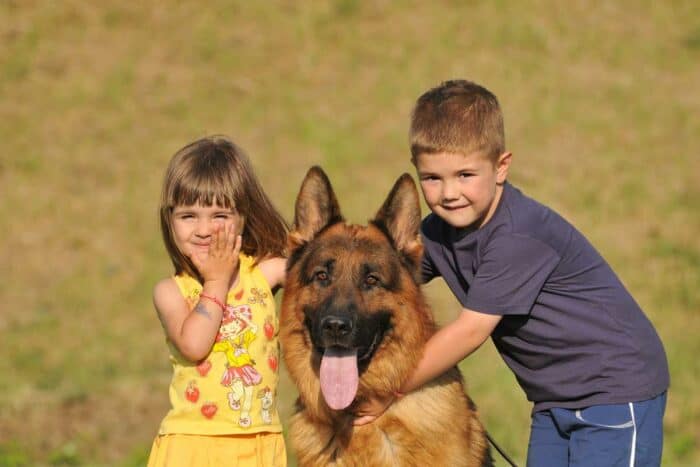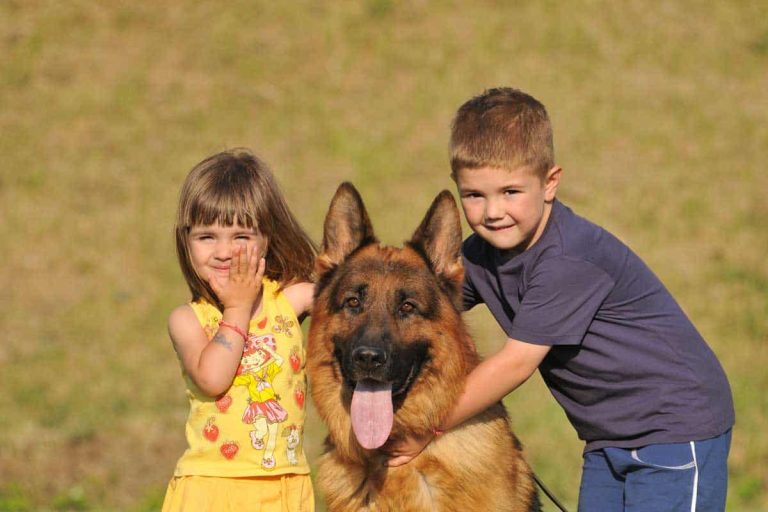This post may contain affiliate links. We may earn money or products from the companies mentioned in this post.
If you are on the hunt for the perfect pup to add to your growing family, then look no further than the German Shepherd Dog!
German Shepherds are great with kids and families of all sizes. This is because they are smart, trainable, loving, and active dogs.
Children are also great to have in the home with a German Shepherd for company, for play mates, and for a large pack/family structure. However, children and large dogs can seem like a worrisome combination.
There is one thing about children that is completely reliable: they are completely unpredictable around animals.
This is the number-one reason why German Shepherds are so good with kids! They have an excellent temperament that allows them to remain calm in unpredictable circumstances.

Read on to find out precisely why German Shepherds make excellent family dogs!
DISCLAIMER: We make a lot of generalizations in this article about German Shepherds. Not all German Shepherds will show all of these traits. Every dog is different even within a breed.
Why Is It Good To Have A Dog And Child In The Same Home?
As I mentioned above, children and dogs go well together because the child and the dog offer each other active, interesting, and engaged pack/playmates.
Both the dog and the child are happy to spend the morning hours running around the garden, digging holes, playing in water, and then snoozing the afternoon away in eager anticipation of dinnertime.
Did I mention they both love snacks and treats?
Having a dog in the home helps teach children a sense of empathy for non-human beings as well as a sense of responsibility as they help take care of the animal.
Having a child in the home with a dog provides the dog with a best friend (or, in their eyes, a hairless puppy) to care for.
Let’s take a more detailed look at the positive impact dogs have on children:
1. A Developed Sense Of Empathy
Children with dogs in the home learn to watch out for beings that do not have a voice and rely on them to do the speaking. This makes them more in tune with their surroundings and to others’ feelings.
Children with dogs tend to develop a sure sense of compassion and empathy to human and nonhuman beings.
2. Strong Sense Of Responsibility
Children who are older or capable enough to take care of a dog will benefit from having one in the home, as they will have to take on responsibility for another living being.
Children who are not old enough or capable enough to feed, groom, exercise, or pick up after a dog can still learn some important things about responsibility, such as packing up their toys once they’re done playing with them to prevent the puppy from chewing on them.
PRO TIP: Even if your child is “old enough” to care for a dog, as the adult, be prepared to constantly remind (dare I say nag) your child to take care of his/her dog. Believe me, I know from experience!
3. Improved Self-Esteem
By trusting your child with an animal, you show them that you have confidence in their abilities, which helps boost their self-esteem.
The tasks do not have to be huge tasks suited for an older child like grooming the dog, walking them, or picking up their messes.
Esteem-building tasks can be as small as the person doing them. For example, a toddler can pour a cup of water in the dog’s water bowl, pour a cup of food in their food bowl, pick up the dog’s blanket and take it to their crate, or kiss the dog goodnight.
The praise that follows for the adult is the important part of the esteem-building process.
4. Reduced Stress And Anxiety
Adults who have pets know that sometimes nothing lifts our dark cloud like coming home to some good ol’ puppy love after an excruciating day at work.
Dogs reduce our stress and anxiety levels simply by being a constant companion and reminder that we are not alone.
The same goes for children. Just looking at the dog you love releases our happy hormones and neurotransmitters, which lighten our mood and relieve stress.
Children receive unconditional love from their pets, which helps them relax and feel happy. This helps them communicate better, learn better, and overall improve their quality of life.
The Dog Needs Training–And So Do The Children!
Training is a key component of owning any dog breed.
However, the bigger the dog breed, the more important training becomes, as small, unintentional behaviors or accidents will be more severe as their size impacts how heavy they are and how scary they can seem.
You don’t have to get into complicated commands and actions; however, all dogs should learn a few basics, such as a:
- Strong recall command
- Sit command
- Stay command
- Quiet command
- Leave/let go command
- Down/get off command
These basic commands will ensure your dog will come back to you if they are off their leash or they slip their collar, will remain at your side, will stop barking, and will leave a person or object alone if you need them to.
However, the dog is not the only one who needs to be trained. The child in the home also needs to be taught how to properly treat a dog, how to be respectful, and how to interact with a large dog breed safely to avoid any accidents.
Teaching your child to read your dog’s body language and what their different behaviors and actions mean goes a long way to ensuring a happy and healthy relationship between your dog and your child that is built on mutual respect of boundaries and solid communication.
Using treats and a food-based reward system with positive interactions with your children is important for two reasons.
First, treats are easy to use because your dog understands food is a good thing and will behave accordingly.
Second, children understand the reward system of treats, too, which makes their inclusion in the training relatable!
Are German Shepherds Good With Children?
German Shepherd Dogs are one of the most intelligent dog breeds and can sense when there is weakness in the pack/family structure.
It is essential that the same commands and training are carried out by all family members, including the kids, to ensure consistent good behavior.
However, by the same token, they are also able to follow the same commands when being given them by anyone within the family as long as all family members have been in on the training sessions.
German Shepherd Dogs love being part of a pack, and children in the home broaden their pack identity depending on how old the child is and how strict they are with training
These dogs are incredibly intelligent and know when a child is part of their pack and when they are guests. Their intelligence helps them to bond with the child on a deep and personal level which leads to a lifelong friendship.
Are German Shepherds Safe Around Children?
Although they can look very intimidating, German Shepherd Dogs are intuitive and think situations through before reacting.
This is especially important, as children can be very unpredictable when interacting with dogs, and you need a dog breed that is going to assess the situation instead of instantly reacting to your child.
German Shepherds do not instinctually react aggressively or explosively when they are met with a child that shrieks or screams, pulls on the dog’s ears and tail, or yanks on handfuls of fur.
Often, the German Shepherd will remove itself from the situation or seek out its adult owner for help.
In terms of loyalty and protectiveness, the German Shepherd dog scores 100/100! They will protect your child from anything they perceive as a danger or threat.
This fierce loyalty binds your German Shepherd and child together as they feel protected and cared for.
Are German Shepherds Too Big For Children?
German Shepherd Dogs are a large breed of dog and are very protective. This means they are a formidable barrier between your child and a threat such as an attacker in a park, a stray dog or wild animal, or an abusive adult.
Playtime is always something to look forward to with German Shepherd dogs because of their size.
Larger dogs are less ‘breakable’ and can withstand quite a bit of rough housing, whereas a smaller dog breed may not want to play as much because they get hurt much easier.
Fortunately, like we touched on earlier, German Shepherds are very calm, aware, and intelligent, so they can handle being around children without accidentally injuring or scaring them.
Larger dogs like a fluffy German Shepherd also make great cuddle partners whether they are young or old, and having something large to cuddle up to provides a sense of safety and happiness to a child.
Things To Consider Before Adopting A German Shepherd
While I could continue to sing the German Shepherd’s praises to the moon and back, it would be irresponsible of me not to shine a light on why the German Shepherd may not be the best dog for your home.
There are certain things to consider when deciding whether a German Shepherd is right for your child or not.
If your child is very small, aurally sensitive, has an issue with large dog breeds, or has had bad experiences with dogs in the past, then a German Shepherd Dog may not be for you.
1. Size
German Shepherds are large. They are tall and sturdy dogs which means they can look rather imposing. While they do not throw their bulk around if they are well-trained, they are prone to jumping on people in excitement.
To a very small child that is the same height as the German Shepherd dog, this can be a terrifying experience and may ruin future interactions with dogs!
Although German Shepherds are among the most gentle and intelligent large breeds, your child still may not be up to the companionship of such a large dog breed.
2. Noise
German Shepherd dogs have a very loud bark, and they are known to bark often with or without provocation.
To children who are sensitive to loud or high-pitched sounds, having a German Shepherd dog can be a distressing experience.
3. Playfulness
German Shepherds are very playful, especially as young adults. They love to run, jump, roll around on the floor, play tug of war, and chase their pack mates for fun.
If they think a child is in on the game, they will treat them like another dog that is playing the game. They will nip at their ankles, pull at their clothes, jump on them, chase them, and try to roll around with them.
If your child is not ready for this level of physicality with a big dog or does not understand doggy playtime rituals, then they may be traumatized by having a German Shepherd dog.
4. Natural Instinct
Most dog breeds have a high prey drive. This means when they see something running away, especially if it is smaller than them, they will chase after it–not to kill or hurt it but just to chase it.
This can pose a problem to adults who have small children who do not understand that if they run, the dog will chase them for fun, not to hurt them.
This natural prey drive can be controlled in German Shepherd dogs with careful training. However, no dog is perfect, and you do not want your child traumatized because your dog wanted to play tag!
FAQs About German Shepherd Dogs And Kids…
Aren’t German Shepherds supposed to be dangerous?
There are many different dogs that are listed as ‘dangerous’ or ‘innately aggressive,’ and this is simply not true and has been spread mainly by ignorant, fear-mongering propaganda.
German Shepherd dogs are among many other dog breeds that are misrepresented as aggressive, mean dogs.
German Shepherd dogs are easily trained, highly intelligent, and proud, which makes them ideal working dogs for the armed forces, the police, search and rescue, and other high-threat and high-intensity jobs.
Their representation in the media and movies has made them seem aggressive and explosive.
However, when proper training and socialization are provided, these dogs make the perfect companions for a home with children.
Wagging Away On German Shepherd Dogs And Kids…
Choosing your precious pup when you have kids can be difficult because you are likely quite worried about their safety and whether the dog will be happy or not.
German Shepherds are excellent dogs to have in the family home!
Before bringing a German Shepherd home to your family, consider the following:
- Can your child handle being around a dog that has a loud bark?
- Is your child old and/or mature enough to tolerate playing with a large breed dog?
- Has your child had negative experiences with large dogs in the past?
Above all, always make sure the breed is the right fit for the child and the child is right for the breed before you bring your new German Shepherd home to your family.
Save To Pinterest

Top Picks For Our Puppies
- BEST PUPPY TOY
We Like: Calmeroos Puppy Toy w/ Heartbeat and Heat Packs – Perfect for new puppies. Helps ease anxiety in their new home. - BEST DOG CHEW
We Like: Bones & Chews Bully Sticks – All of our puppies love to bite, nip, and chew. We love using Bully Sticks to help divert these unwanted behaviors. - BEST DOG TREATS
We Like: Crazy Dog Train-Me Treats – We use these as our high-value treats for our guide dog puppies. - BEST FRESH DOG FOOD
We Like: The Farmer’s Dog – A couple months ago we started feeding Raven fresh dog food and she loves it! Get 50% off your first order of The Farmer’s Dog.
Check out more of our favorites on our New Puppy Checklist.























